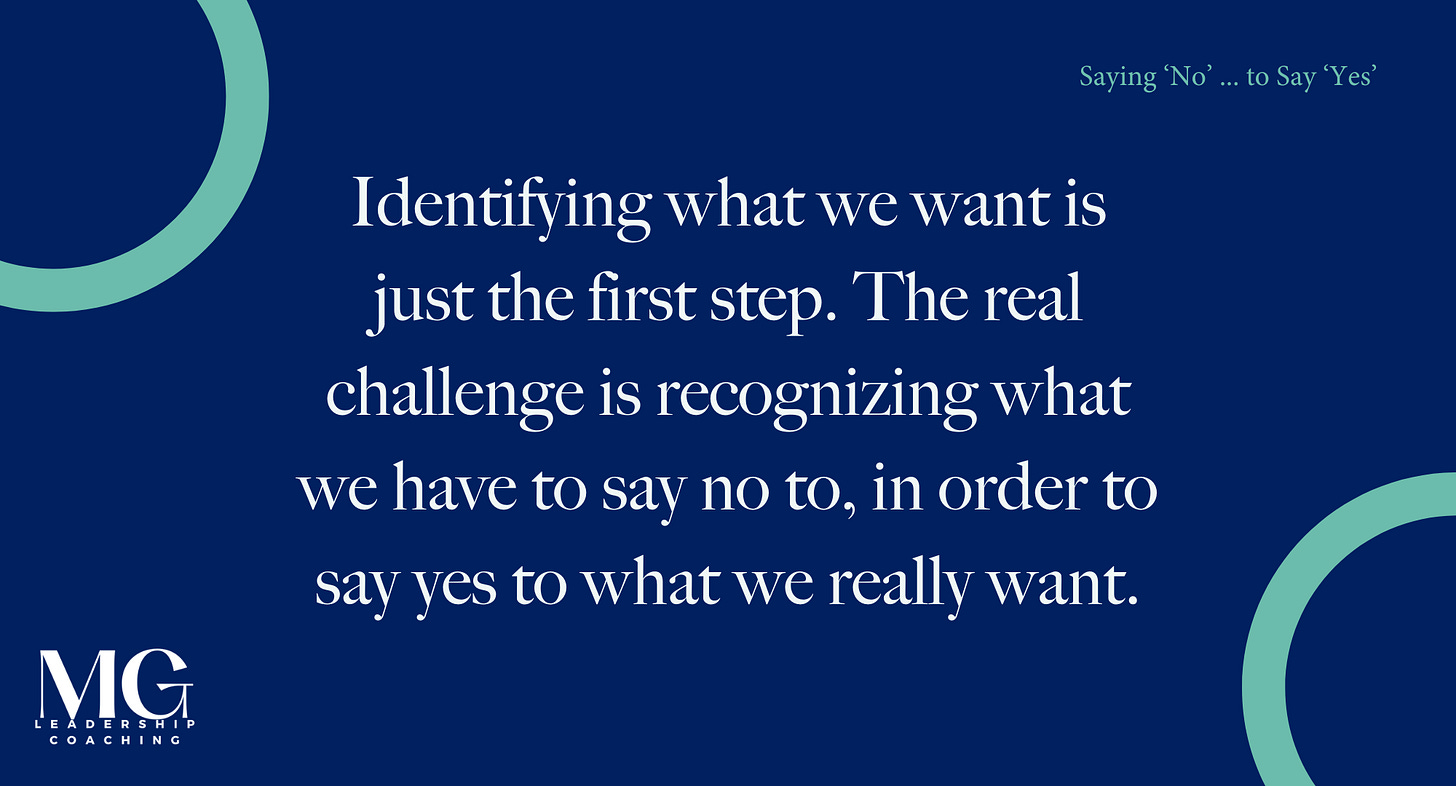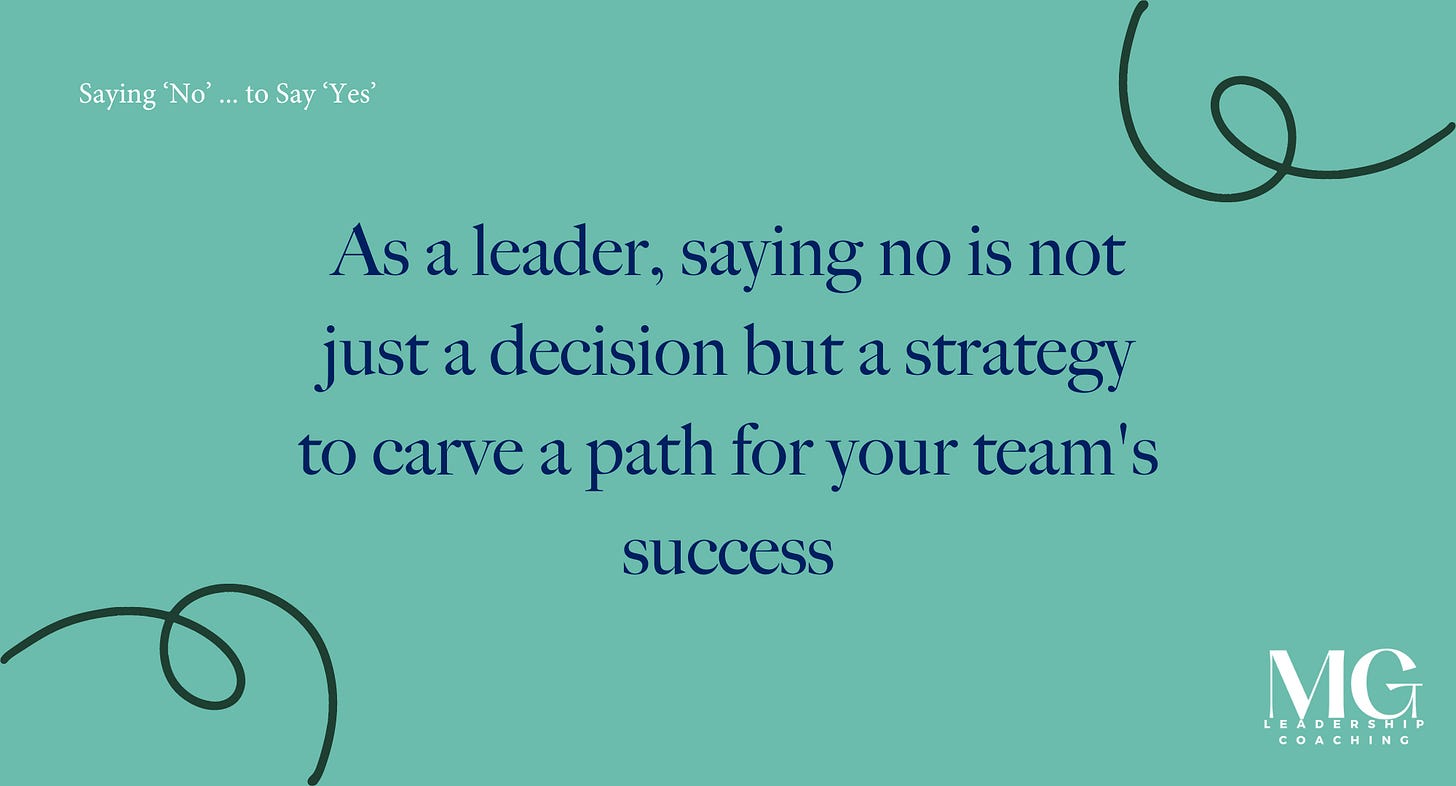“What do you have to say no to …in order to say yes?”
The recipe for success is:
One part knowing what you want
Two parts knowing what you have to say no to in order to get what you want
Four parts actually saying no
Shaken and served straight-up in a coupe glass.
When it comes to making change, we focus heavily on what we want. In fact, entire books have been dedicated to it (think: Designing Your Life, Find Your Why, The Stuck Book).
But identifying what we want is only the first step to accomplishing our goals. The real challenge is recognizing what we have to say no to in order to say yes to what we really want.
Story Time
Let's rewind five years to when I decided to say yes to becoming a leadership coach. I knew saying yes meant committing time, energy and expenses. What I didn’t consider? The necessity of also saying no. Saying no to my prior self-definition and values.
Fast forward two years into my coaching journey, and I got a tempting offer to step up my marketing career at my organization. A director of marketing at the time, this was a big move up the ladder. I have always prided myself as someone who took on any challenge or opportunity presented to me - and this was definitely a big one. Excitement initially clouded my judgment until I realized that saying yes to this role meant saying no to the time and energy I needed for coaching. So, with greater clarity, I responded,
“If I had the goal of becoming a VP of Marketing, this would be my ideal next step. But I am going to have to say no. My goal is to become a leadership coach.”
A year later, I found myself as a contract marketer at Google Cloud, coaching on the side. A golden opportunity emerged for a full-time role at Google, a dream since my college days! Despite the security and financial benefits, taking a full time marketing role didn't align with my goal to become a leadership coach. Through gritted teeth, I said,
“Unfortunately, and I do mean unfortunately, I have to say no”.
Everyday life
Without the courage to say no, I would have never been able to say yes to becoming a leadership coach. This 'say no to say yes' principle isn't just for life-altering decisions; it's woven into our daily lives.
Take the universal goal of working out more. You set the goal of working out four times a week, and do all the prep: gym bag, protein drink, killer playlist. You are ready to go. You’ve focused on all of the things you need to say yes to, in order to accomplish your goal. But now it’s the next morning and your alarm is going off, an hour earlier. Or your co-worker invites you out for impromptu drinks after work. Or it’s the end of the work day and you still have to prep for a presentation tomorrow…
You’ve prepared for all of the things you could say yes to, but you didn’t think about the things you need to say no to:
Hitting snooze
Binge-watching that extra episode
After-work plans conflicting with your gym class
Poor work prioritization
Always saying yes to extra projects keeping you late at the office
You as a leader
How does this apply to leadership?
It’s the beginning of the quarter. Quarterly planning kicks off with a reflective look at the previous quarter – the wins, the lessons, and areas for improvement. As you gaze upward, the broader company objectives come into focus. A lively team meeting follows, where everyone pitches in ideas for the upcoming quarter's goals. With collaborative effort, the list is narrowed down, fine-tuned, and the exciting discussion begins on the necessary preparations to conquer those goals.
While gearing up for success, we meticulously plan for everything we need to say yes to; but, how often do we outline what we need to say no to, in order to pave the way for those goals?
Sure, there are projects and goals that we deliberately set aside, uttering a firm "no." But have we considered the behaviors, processes, and mindsets our team should reject to make room to say yes to the quarterly goals?
Furthermore, as a leader, how will you support your team in saying no?
When another team makes unexpected requests, what should your team do?
When pressure tempts them to revert to oldways, how will you help strengthen new processes?
When adopting a new mindset what makes them vulnerable? How will you as a leader support them?
This is just a starting list of things to think about when it comes to saying no, to say yes to your team’s goals, your leadership and your life.
HOMEWORK: What do you want to “say yes” to at work? As a leader? In life? What do you have to “say no” to for that to happen?
Let me know how it goes.







I must admit I am very often setting new goals I want to achieve. Often times either falling short or it has taken me much much longer to achieve the goal. After reading reading you Leader's Guide letter I realize the obvious. I am always trying to achieve new goals and not saying no to things that are interfering with that path!